Harnessing Efficiency: Are Heat Pumps the Champion of Global Carbon Reduction?
By Ali Haj Fraj
The HVAC (Heating, Ventilation, and Air Conditioning) industry plays a crucial role in the quest for sustainable living and combating climate change.
As mentioned in one of my blogs earlier this year, the heating and cooling of buildings accounts for 40% of all energy consumed in the European Union. Moreover, about 75% of buildings are energy inefficient (Eurostat 2020 research). It becomes even more significant when we understand that building heating alone is responsible for 4 gigatonnes (Gt) of CO2 emissions annually, which equates to 10% of all global emissions, and 37% of global CO2 emissions are attributable to buildings.
Among innovations transforming the HVAC industry, heat pumps have emerged as champions of efficiency and environmental sustainability. According to a study by the International Energy Agency (IEA), widespread adoption of heat pumps for both heating and cooling purposes could reduce overall global CO2 emissions by up to 8 gigatons per year by 2050.
Heat pumps operate on a simple yet ingenious principle – they move heat from one place to another, extracting heat from the air, ground, or water, depending on the type of system, rather than generating heat directly. Traditional HVAC systems often struggle to both heat and cool efficiently, whereas heat pumps can handle both functions seamlessly, ensuring year-round comfort often with significantly lower energy consumption and higher cost savings when compared with conventional systems.
Heat Pumps are key on the path to net-zero buildings and decarbonization
Energy Efficiency and Cost Savings:
A standout feature of heat pumps is their exceptional energy efficiency. Heat pumps can produce as much as 4 units of heat for every unit of power consumed. This ‘400% Efficiency’ makes them key in the battle to address climate change. It also positions heat pumps as a cost-effective long-term investment.
Reduced Carbon Footprint:
One of the most compelling reasons to embrace heat pumps is their positive impact on carbon reduction. As I mentioned before, heating methods reliant on fossil fuels contribute significantly to carbon emissions. In contrast, heat pumps exclusively rely on electricity, which can increasingly be provided by renewable energy sources, further reducing carbon emissions.
Renewable Energy Integration:
As the world shifts towards cleaner energy options and electrification, the synergy between heat pumps and renewable energy becomes a potent force for environmental change. Solar panels, wind turbines, and other renewable sources can power heat pumps, creating more sustainable heating and cooling ecosystems. When integrated with microgrids on-site, they become even more effective in reducing emissions.
Government Incentives:
Governments worldwide recognize the importance of sustainable HVAC solutions, offering incentives to encourage the adoption of heat pumps, reducing upfront costs, and allowing those who make the switch to contribute to the broader goal of carbon reduction sooner.
Schneider Electric’s solutions for HVAC industry boost sustainability efforts
At a commercial and industrial level, we offer a range of HVAC control and hardware solutions to support the use of heat pump methods, further boosting the efficiency, cost savings, and emissions reductions that can be achieved.
Eliwell, the Schneider Electric group center for HVAC-R applications has been a key player in the industry for over 40 years, and a part of our group since 2014.
In a recent case study presented by Sergio Bridda of Eliwell at the 2022 ATMOsphere (ATMO) Europe Summit, it was shown that integrating different HVAC&R elements into one centralized system resulted in a 70% reduction in energy consumption at a 3,000m2 (32,300ft2) commercial property in Sweden.
The building previously required 221MWh for district heating and 13.5MWh of electricity for its cooling needs. Eliwell worked with Milan Polytechnic to develop an algorithm that would deliver the best COP (coefficient of performance) based on the end users’ needs. After installing a reversible CO2 heat pump and Eliwell solutions, the building’s overall energy requirements were reduced to just 71.1MWh.
You can find out more about Eliwell’s efforts in the quest for efficiency and carbon reduction in my previous blogs How to keep people comfortable more sustainably and How to keep food and goods fresh while decarbonizing our world.
Another example of how we’re helping to build the next generation of HVAC controls is our work with Transtherm Cooling Industries Ltd., headquartered in Coventry, UK. Transtherm has been pioneering the technological advancement of commercial heat exchangers, refrigerants, and water-cooling systems since 1989. Along with data centers, the coolers are used in buildings where operations take place around the clock, such as hospitals, universities, and retail environments. These organizations demand complete visibility over their energy infrastructure, whereby safety features can be monitored, readings can be shared, and processes can be fine-tuned remotely.
Transtherm partnered with Schneider Electric to futureproof its cooling systems, allowing for smart communication between machines and remote access, and increasing overall energy efficiency.
Heat pumps, and the solutions that support their use, are rapidly emerging as a transformative solution in the HVAC industry, offering a trifecta of benefits – energy efficiency, carbon reduction, and long-term cost savings. As we navigate the challenges of climate change, adopting heat pumps, be it in residential, commercial, or industrial settings, represents a tangible and impactful step towards a sustainable future and can help us to make significant progress in the collective effort to reduce our overall environmental footprint.
Learn more about how heat pumps can boost your carbon reduction efforts:
Smart and IoT-enabled HVAC equipment with EcoStruxure™
IEA report: The future of heat pumps: Schneider Electric’s new research shows that digital and electric solutions can cut carbon emissions in office buildings by up to 70%



